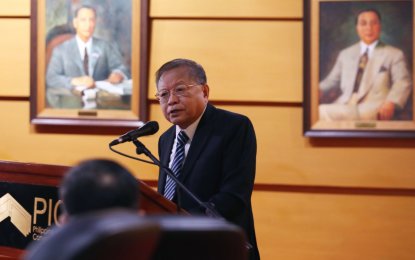
“Ang intesyon ay to help the appointments be less policticized at para ‘di ma-monopolize ng isang political branch of the government, a balancing act (The intention is to help appointments get less politicized and to evade the monopolization of one branch of government, a balancing act),” Puno said in his speech during the National Federalism Summit in Manila. (PNA File Photo)
MANILA — Former chief justice and consultative committee chairman Reynato Puno on Friday cited the depoliticization in the appointing process of justices as one of the key benefits in pushing for a federalized Philippines.
“Ang intesyon ay to help the appointments be less policticized at para ‘di ma-monopolize ng isang political branch of the government, a balancing act (The intention is to help appointments get less politicized and to evade the monopolization of one branch of government, a balancing act),” Puno said in his speech during the National Federalism Summit in Manila.
Under the Constitution, members of the Supreme Court (SC) and judges of inferior courts are appointed by the President.
The proposed SC structure under the federal system, composed of nine justices, would be divided into three high courts — the Federal Supreme Court, Federal Constitutional Court, and Federal Administrative Court.
“The nine justices will be appointed by different authorities: three will be chosen by the President, three by the Congress through the Commission on Appointments, while three by the Constitutional Court,” he said, adding this also ensures that the officials appointed are vetted well.
Puno also noted that the establishment of a Constitutional Court allows the SC to give its opinion on legislations heard by Congress, particularly when a bill’s constitutionality is in question.
“The Constitutional court is given power under the Bayanihan Constitution to give advisory opinion. Today, that is not allowed,” he said.
The Bayanihan Constitution or Bayanihan Federalism, otherwise known as the “Power to the People, Power to the Regions”, is the title of the draft Constitution submitted by the Consultative Committee to President Rodrigo Duterte last year.
“In our model, there would be fusion of powers, not unlike in the current system, there is a concrete separation of powers between the judicial, legislative, and the executive branch.
In the Bayanihan Constitution, there is interdependence of power for the benefit of the country,” he added.
During the summit, participants, including Sultan Kudarat Governor Pax Mangudadatu, committed to fully support federalism.
“In my province, I started already in 2017 and I’m conducting several information drives to promote the federalization of the Philippines,” Mangudadatu told the Philippine News Agency (PNA).
Department of the Interior and Local Government (DILG) Assistant Secretary Jonathan Malaya, meanwhile, said the government is conducting similar initiatives nationwide.
DILG’s major programs include Federalism 101 and town hall consultations.
Discussions with different agencies in the government are also ongoing, he said.
Aside from these, the agency likewise continues to present its research studies to the public and rally different sectors and stakeholders in advocating for federalism.






















